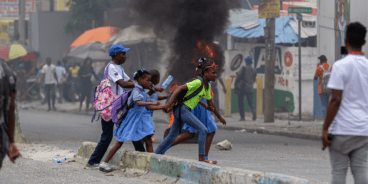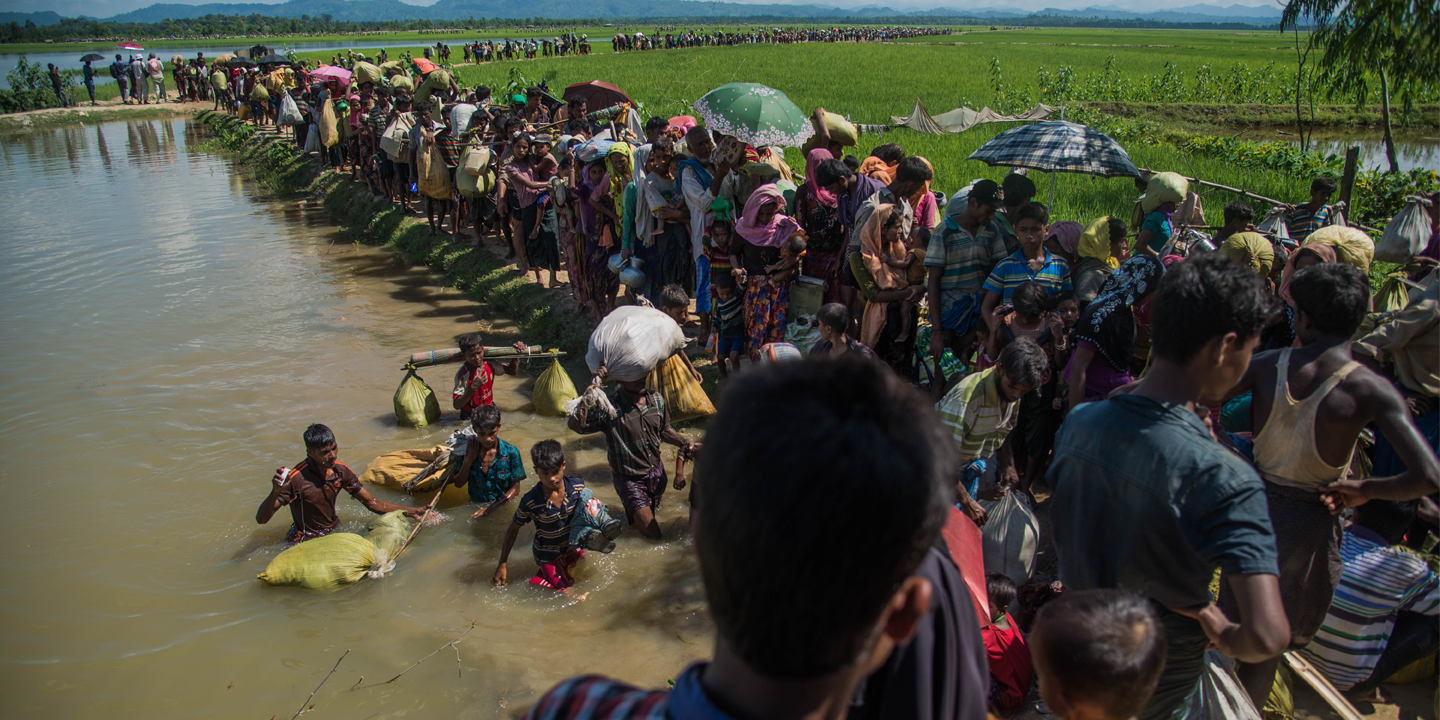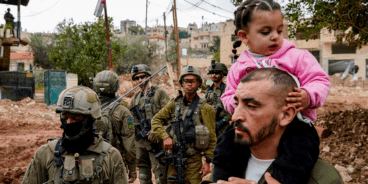

Atrocity Alert No. 219: Myanmar (Burma), Libya and International Day to Protect Education from Attack
Atrocity Alert is a weekly publication by the Global Centre for the Responsibility to Protect highlighting situations where populations are at risk of, or are enduring, mass atrocity crimes.
Perpetrator testimonies may help advance justice and accountability for Rohingya genocide
On 8 September the New York Times published extracts from the video testimonies of two soldiers, Private Myo Win Tun and Private Zaw Naing Tun, who allegedly deserted from Myanmar’s military, the Tatmadaw. The Tatmadaw are accused of carrying out genocidal “clearance operations” against Myanmar’s Rohingya ethnic minority during 2017. The testimonies, which were shared with international prosecutors, mark the first time that Tatmadaw soldiers have openly confessed to having killed and raped Rohingya civilians on the orders of their commanders.
According to the testimonies, the two soldiers received nearly identical orders from their commanding officers before entering Rohingya villages, including “Shoot all you see and all you hear” and “Kill all you see, whether children or adults.” Private Myo Win Tun said he took part in killing 30 Rohingya villagers and raped a woman. Private Zaw Naing Tun said his battalion “wiped out about 20 villages” and killed an estimated 80 Rohingya civilians. Both soldiers admitted to dumping bodies in mass graves. On Monday, 7 September, the two soldiers were transported to The Hague, where the International Criminal Court is conducting an investigation into atrocities committed against the Rohingya.
The descriptions given by the two soldiers are consistent with survivor testimonies and the observations of the UN Human Rights Council-mandated Independent International Fact-Finding Mission on Myanmar (FFM), which found that the “clearance operations” against the Rohingya were characterized by widespread mass killings, sexual violence, torture, destruction of Rohingya villages and forced displacement. The FFM concluded that the treatment of the Rohingya amounts to genocide, crimes against humanity and war crimes.
The soldiers’ testimony will also likely contribute to the ongoing case at the International Court of Justice (ICJ), where The Gambia has accused Myanmar of violating the UN Convention on the Prevention and Punishment of the Crime of Genocide. On 2 September Canada and the Netherlands announced their intention to intervene in support of the ICJ case with a focus on “crimes related to sexual and gender-based violence, including rape.”
“These perpetrator testimonies represent an important development in the ongoing struggle for justice and accountability for the Rohingya genocide,” said Dr. Simon Adams, Executive Director at the Global Centre for the Responsibility to Protect. “My hope is that they will now lead to the prosecution of senior military officers responsible for ordering these young men to commit genocide and other atrocities in Myanmar.”
‘Horrendous conditions’ in Libyan migrant detention centers
Despite ongoing fighting between the self-proclaimed Libyan Arab Armed Forces and the UN-backed Government of National Accord (GNA), thousands of migrants, refugees and asylum seekers – predominantly from the horn of Africa, West Africa and the Sahel – continue to pass through Libya before attempting to make the dangerous and deadly crossing from Libya to Europe. Those who are apprehended and detained in Libya are often subjected to sexual violence, torture and forced labor perpetrated by state officials and armed groups, as well as by human traffickers.
Migrants intercepted by the Libyan Coast Guard are also sent to detention centers where they face grave violations and abuses of their human rights. The European Union and its member states have generally supported the Libyan authorities’ efforts to intercept refugees and migrants at sea despite various UN officials declaring that, “Libya cannot be considered a safe port for disembarkation.” According to a recent report by Amnesty International, more than 7,250 people have been returned to Libya so far this year. It is also estimated that almost 400 migrants have died since January while attempting to cross the Mediterranean Sea.
According to the UN, as of 31 July at least 2,780 migrants and refugees were being detained at government-run centers in Libya, 22 percent of whom were children. Many more are being detained at unofficial sites. UN Secretary-General António Guterres submitted a report to the UN Security Council on Friday, 4 September, stating that, “nothing can justify the horrendous conditions under which refugees and migrants are detained in Libya” and renewed his call for the Libyan authorities to “close all detention centers.”
The risks to those in detention are particularly acute due to the ongoing armed conflict and COVID-19 pandemic. During July 2019 at least 53 people were killed and 130 injured when an airstrike hit a migrant detention center in Tajoura. Despite international condemnation, no one has been held accountable for the attack. Detention centers also face severe overcrowding, with insufficient food, water, medical care and sanitation.
The GNA must end systematic violations of international law perpetrated against refugees, migrants and asylum seekers. Sarah Hunter, Communications and Digital Media Officer at the Global Centre for the Responsibility to Protect, noted that, “the Libyan authorities should heed the Secretary-General’s call to close the detention centers and ensure all migrants, asylum seekers and refugees, particularly children, are protected. All human traffickers and those responsible for these grave violations against detainees should be held accountable.”
International Day to Protect Education from Attack
Today, 9 September, marks the first International Day to Protect Education from Attack, calling attention to the plight of more than 75 million children in 35 crisis-affected countries where attacks on educational facilities and personnel contravene international law.
According to the Global Coalition to Protect Education from Attack, at least 22,000 students and educators were injured, harmed or killed in more than 11,000 separate attacks on education, or incidents of the military use of schools, between 2015 and 2019. In Cameroon, over 1,000 school and university students and staff were threatened, abducted, injured or killed by armed groups or state security forces. In Afghanistan, parties to the conflict continue to use explosive weapons during attacks on educational institutions. Yemen, meanwhile, reported an average of one attack per day, with over 2,000 incidents in five years.
Tomorrow, 10 September, the UN Security Council is scheduled to convene a debate on “attacks against schools: a grave violation of children’s rights” with a special focus on the Sahel region. As the security situation in the Sahel continues to deteriorate, armed Islamist groups in Burkina Faso, Mali and Niger have increasingly burned and looted schools while also threatening, abducting or killing teachers. By the end of 2019 more than 3,300 schools were closed across the Central Sahel, affecting approximately 650,000 children and more than 16,000 teachers.
As the world continues to grapple with the COVID-19 pandemic, which has led to school closures for more than 90 percent of the world’s student population, the need to provide protection to all students and teachers is more urgent than ever. UN Secretary-General António Guterres stressed, “as the world fights to contain the COVID-19 pandemic, children and youth in conflict zones remain among the most vulnerable to its devastating impact. We must ensure our children have a safe and secure environment in which to learn the knowledge and skills they need for the future.”
All UN member states should sign the Safe Schools Declaration and work to ensure that schools, teachers and children are consistently protected.
Related Content


Populations at Risk, March 2025
